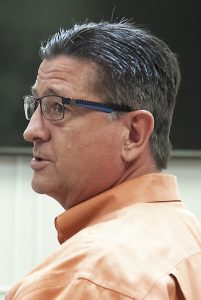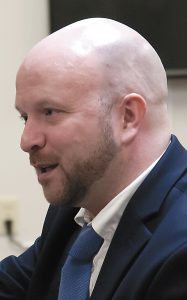Search to resume soon
An offer by the City of Tracy to one of the three finalists for the city administrator position was rejected, interim City Administrator Shane Daniels said Tuesday.
Daniels said the candidate took a job in another city.
“So we’re back to square one again,” he said.
The search will resume soon, pending discussion by the city council at Monday’s meeting.
“The way it sounds is they want to re-open (the search),” Daniels said.
The job listing had been posted on the League of Minnesota Cities website.
• Moving Tracy forward was the theme for all three finalist candidates in the city administrator interviews Friday night. Jeff Carpenter and Michael Quinlivan were interviewed in person, while Kelly Groskurth was interviewed remotely through Skype.
The vacancy was created when Kris Ambuehl resigned this summer to take the same position in St. Joseph. Ambuehl was sworn in as city administrator on June 25, 2018. His resignation was formally accepted by the Tracy City Council on July 30 of this year.
Friday’s interview included several questions posed to the candidates relating to their experience and their plans for the future of Tracy:
You are aware of some of the challenges we’re currently experiencing in the city. If you are hired as the administrator, how would you propose we move forward?

Jeff Carpenter, current EDA Director in Tracy: “One of the things we need to do is we need to have everybody on the same page. That’s not an easy task. We need to work with what’s within the city, working with the staff to make sure we all have the same goal and how we respond to things such as social media. The city of Tracy, you need to reach out to people as the City Administrator to the residents of Tracy and say hey, I’m glad you have this particular social media site, but can we talk about a few of the things that are being put in there because we don’t always want it to be a negative thing. Is there anything we can do to help each other out, for you to help the city out. You can also talk to people and have those conversations. You can’t have sides. Eventually this city needs to get to the point where we don’t have this side and this side. There is a middle point. I think the city administrator has to be that middle point. I think I have shown that I am that. I don’t care what side you are on, I’m looking for the good in everybody. What are you bringing to the table? If everyone is using what they do best for the good of the city, that’s when we’re going to succeed. There is going to be bumps in the road. I don’t stress enough how much communication is needed. It doesn’t matter if it is a city of 2100 like this or a city of 10,000, there has to be communication constantly.”

Michael Quinlivan, a financial crimes analyst with Wells Fargo in Sioux Falls, SD: “I think every city and business needs a clear vision, value, mission. If you can agree on those three things: Why are we here? What are we trying to do? What is that which we hold dear and are trying to deliver? You can get everything done. I would refocus. While it sounds simple, it presents some difficulty with some division, you can get one strip done and move forward from there. You use that as a beginning to the end and expand from there.”
Kelly Groskurth, currently the city manager/city clerk for the City of Treynor, IA: “Definitely need some training, just some good old fashioned workshops and sit downs and learn about conflict of interest and what smells like conflict of interest and if it smells like conflict of interest let’s back away. Open meetings – be very open about agendas. Let’s get them out there on the website before the meetings. Let’s get them out there on Facebook and say the new agenda is posted and let’s be more open with the public. You can’t make them read what you post, but if it’s there and you are being far more open, it’s all there for them to see, we’re not hiding anything. Sometimes we got to put it out there even more, so that they don’t see it as hiding, so they don’t have to look for it. The other thing is get to talking to people. Talk to the citizens, why do you think there is an open meeting violation, where is this perception coming from?”
See this week’s Headlight Herald for more on this article.
